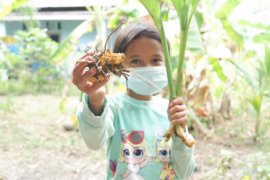Climate change has a huge impact on the environment, it directly affects the health sector. Research shows that the emergence of infectious diseases is increasing along with climate changeJakarta (ANTARA) - The incidence of infectious diseases is increasing on account of climate change, according to an official from the National Research and Innovation Agency (BRIN).
"Climate change has a huge impact on the environment, it directly affects the health sector. Research shows that the emergence of infectious diseases is increasing along with climate change," the head of BRIN's Genetic Engineering Research Organization, Ratih Asmana Ningrum, said here on Wednesday.
She outlined some infectious diseases linked to the impact of climate change, such as zika, malaria, dengue fever, influenza, ebola, COVID-19, and mainly zoonoses that are vector-mediated.
However, new infectious diseases may also become more dangerous in the future, she added.
Related news: National research agency forms CSIRT to prevent cyber attacks
Based on the literature, there are around 1.7 million viruses that have not been revealed in mammals and birds, and 827 thousand of them have the ability to infect humans, Ningrum informed.
Therefore, protecting ecosystems and biodiversity will be crucial to preventing diseases and pandemics in the future, she said.
"Ecosystem functions are similar to those of the human body. When they are healthy, they are more resistant to disease. But when forests and other natural ecosystems are damaged, wildlife is forced to come into closer contact with farm animals and people. This creates conditions for disease to spread rapidly," she explained.
She said that the cause of climate change is also the reason for the emergence of diseases, especially infectious diseases. Thus, in this sense, the emergence of infectious diseases and even pandemics is entirely driven by human activities.
Related news: Huawei, BRIN Sign Memorandum of Understanding for AI Research and Innovation to Strengthen Digital Ecosystem
According to Ningrum, changes in the way humans use land, production patterns, and consumption that disrupts nature can disturb ecosystems and increase contact between wildlife, livestock, pathogens, and humans, resulting in the spread of disease. Such contact allows pathogens to cross between species and spread rapidly.
The concept of one health must be realized because a healthy environment and animals around humans can create healthy humans as well, she said. In addition, preparedness against disease and pandemics will also be important to save lives in the future.
"We must maintain the ecosystem together. This effort is important and involves many parties, starting from the lowest level, namely the family to the global level," she added.
Related news: Mastering sorghum production vital to anticipate food crisis: BRIN
Related news: Technology, research important to develop halal industry: BRIN
Translator: Martha Herlinawati S, Resinta S
Editor: Fardah Assegaf
Copyright © ANTARA 2022












